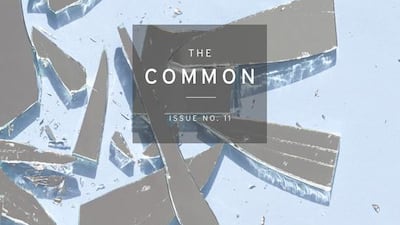Displaced people fleeing wars; stories with mischievous jinn and beautiful princesses; fables with sages and flying carpets. These are typical stories associated with the Arab world,new and old. Any other type of literature, particularly contemporary fiction that eschews these clichés, has a harder time finding an audience.
Enter two editors: one from the United States; and one from Jordan, who took on the challenge of introducing 25 short stories of fiction from 15 Middle Eastern countries; stories that refute stereotypes about Arab writing.
Translated into English, they were published in a special issue of US literary journal The Common. The initiative was discussed at NYUAD on Thursday, together with issues of translation and international collaboration, at the panel Tajdeed: Bringing Contemporary Arabic Stories to America.
“It is a challenge to introduce readers to a new literary culture,” says Jennifer Acker, founder and editor-in-chief of The Common, who also teaches at Amherst College, Massachusetts.
Working with award-winning Jordanian writer, Hisham Bustani, the issue was published on April 6, 2016, and titled Tajdeed (Renewal). “It was called Tajdeed to begin a renewal of interest and a renewal of investment in literary craft and experimentation, as the style of these pieces is not traditional,” says Acker.
It features award-winning writers such as Zakaria Tamer (Syria) and Hassan Blasim (Iraq), as well as authors published in English for the first time. There is also a short story, A Bouquet, by Emirati writer Fatima Al Mazrouei.
While the issue attracted interest from the publishing and academic worlds, generating interest in translated works remains a challenge.
“A lot of readers think of reading works in translation as doing something that is ‘good for you’, like eating your vegetables,” says Acker. “Those of us invested in translating and publishing and promoting Arabic works want to change that perception, so that people realise that reading the short stories like the pieces in Tajdeed is more like the pleasure of eating ice cream.
“Although many of the pieces we published have quite a dark worldview and perhaps should not be read before bedtime.”
Another hurdle is finding the right translator. “The number of translators who are both bilingual and bicultural is not huge and these people have limited time and funds,” she says.
“Arabic is a difficult language and there are so many different registers, as well as country-specific idioms, of course. You need the right marriage of writer and translator to render a work into not only digestible English but English with its original, intended flavours.”
A collaborative process that spanned four years, Bustani, who chose most of the work, says: “My criteria was to introduce what I call ‘new Arabic writing,’ and by new, I do not mean ‘young’ or emerging writers, but a new approach to theme and style that departs from ‘traditional’ or ‘classical’.
“In the US, only three per cent of all published books in a year are translations from all the other languages of the world. Within that three per cent, only one per cent are translations from Arabic; that makes translations from Arabic so infinitesimal that it does not appear on the radar of the English-speaking world.”
Bustani says a lack of literary translation initiatives in the Middle East means that “only the glamorous novel awards get some of the novels into English”.
“Those novels that reside outside the politics of awards, the short-story form and poetry, all those are the orphans of the contemporary Arabic literary scene.”
There is also bias, where the English-speaking world has certain expectations about Arab literature.
“So literature in translation that succumbs to superficial perceptions about the violent, abusive, terrorist, fundamentalist, misogynist Arab will find an easier way to get published than works that dig deep, explore complexities and refuse to make artistic short-cuts,” says Bustani.
“Also, publishers are not interested, and when they are, they are interested in works that reflect their own [usually superficial] understanding about our region.”
Youssef Rakha, an acclaimed Egyptian writer with more than eight published books, wrote the introduction to Tajdeed and was part of the panel discussion on Thursday, along with Acker and Bustani.
“I thought it was a very reasonably representative selection, although I would seriously object to the idea of ‘the best of’, simply because, however objective one tries to be, such a choice inevitably remains subjective,” he says.
Given US president Donald Trump’s attempts at imposing a travel ban on six Muslim-majority countries, could this actually prove beneficial for Arabic fiction?
“America’s antagonistic engagement in the Middle East and with Muslims of all nationalities has raised interest in Arabic communities,” says Acker. “Our hope is that contemporary Arabic writers will someday soon enter people’s consciousness as simply ‘writers’ known for their craft, poeticism and storytelling.”
Rym Ghazal is a feature writer at The National.

